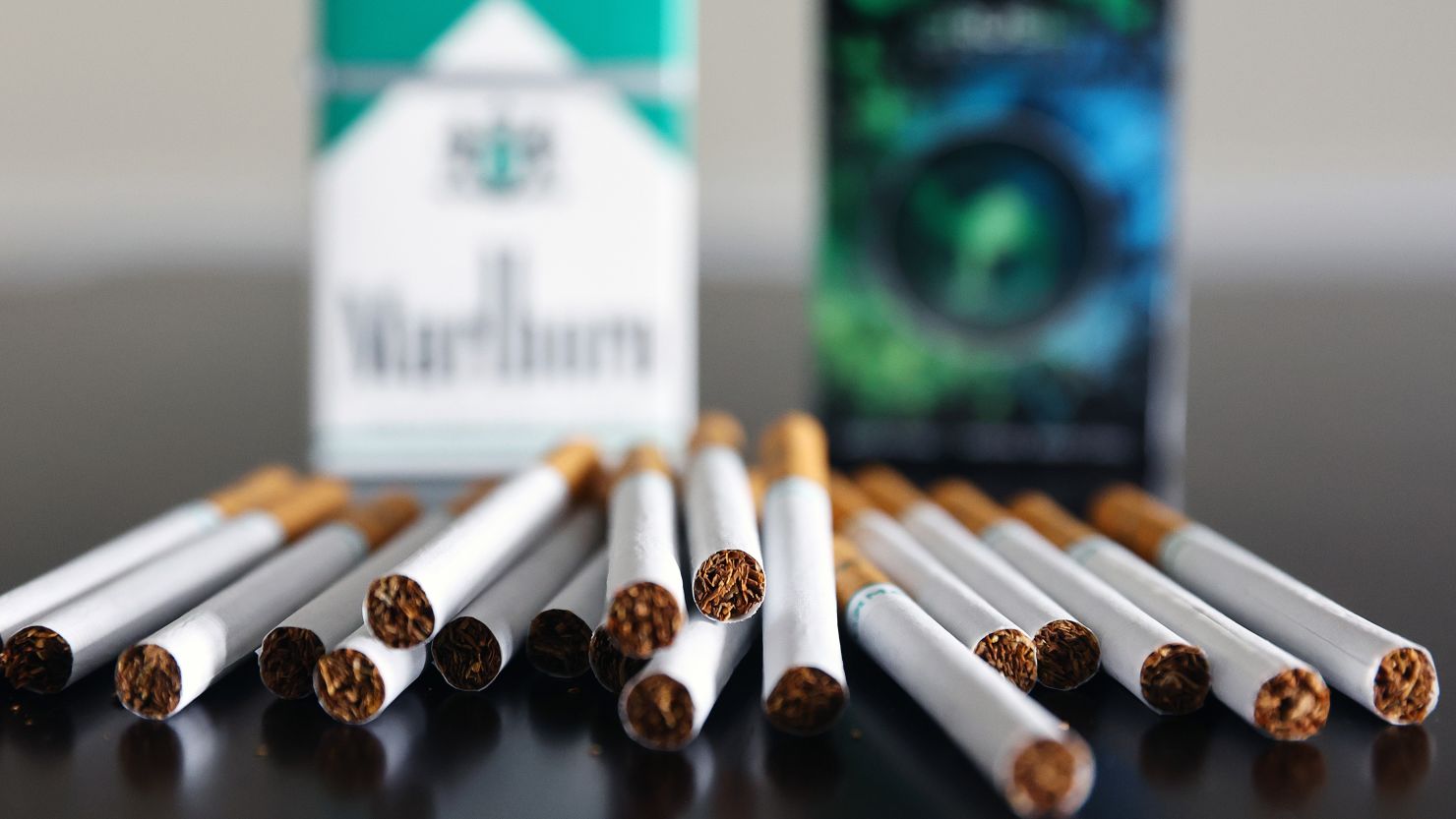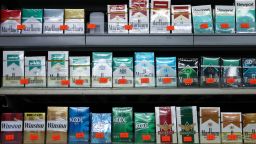Long-awaited federal rules that would ban menthol flavoring in cigarettes have been delayed, angering health advocates who charge that the Biden Administration has postponed the ban to avoid alienating Black voters, who disproportionately smoke menthol-flavored tobacco products.
On Wednesday afternoon, the federal government published its regulatory to-do list, officially known as the Unified Agenda of Regulatory and Deregulatory Actions. The final menthol rule is now expected in March, according to the calendar.
The move comes amid intense lobbying by the tobacco industry to block the ban.
“In the last few weeks, the tobacco industry has increased pressure on the White House to delay or stop the advancement of these rules. The tobacco industry will do anything to protect their profits at the expense of public health,” said Harold Wimmer, chief executive officer of the American Lung Association, in a statement.
The administration had originally planned to have the rule finalized by August 2023. The government later signaled that the rule was coming before the end of the year. Now, the rules are not expected until March, at the earliest. The delay of the new rule was first reported by The Washington Post.
The public calendar of the Biden administration’s meetings around regulatory actions shows that in the past month, 41 meetings have been scheduled on the menthol rule; 38 were with tobacco industry groups and their allies while the other three were with public health groups.
“We are still waiting to hear back from them. They have not scheduled a meeting with us yet,” said Erika Sward, the American Lung Association’s national assistant vice president of advocacy, adding that the group made its request for a meeting with the Biden administration a month ago.
Sward said that other groups – including the American Cancer Society’s Cancer Action Network, the National Hispanic Medical Association and other groups of Black faith leaders who strongly support ending the sale of menthol – have also not been able to meet with officials on the rule.
It doesn’t usually take this long to get a meeting, she said.
“The Lung Association has every reason to believe that any potential delay will be because of the tobacco industry and their conversations with the White House,” Sward said.
Tobacco industry cites police violence
One group that did meet with the administration was the National Organization of Black Law Enforcement Executives, or NOBLE. Alongside the organization’s executive director at the session was a former lawmaker turned lobbyist for the cigarette company Altria, which is also one of the sponsors of NOBLE.
Two other organizations that have received funding from the tobacco industry were in attendance, as well: the Rev. Al Sharpton’s National Action Network and the National Newspaper Publishers Association. Two dozen Biden administration officials, including US Food and Drug Administration Commissioner Dr. Robert Califf and US Secretary of Health and Human Services Xavier Becerra, were also on the roster.
The tobacco industry has been working to align itself with African American advocacy groups in a bid to resist further regulation. Among its arguments against a ban is that it would criminalize the flavor of cigarettes preferred by Black smokers, leading to an underground market on the goods. It points to the police killing of Eric Garner, a Black man accused of selling loose cigarettes, as one example of a petty crime that escalated into a fatality, a position that is also supported by the American Civil Liberties Union.
Many other African American advocacy organizations have long fought for a ban on menthol cigarettes, however, because of their heavy impact on Black lives.
“African Americans suffer disproportionately from being addicted to cigarettes and the effects of long-term tobacco use. It seems only correct in making the next step in the interest of the Black community to ban menthol – the last allowable flavor which is and has always been known as the flavor that African Americans have preferred and highly utilized,” the NAACP says in a statement supporting the menthol ban on its website.
The Biden administration says the apparent imbalance in the discussions favoring industry groups stems from the way meetings are entered into the public calendar. When the administration talks with groups, individuals within the group can request separate appointments, inflating the total, according to an administration official, who asked not to be named because they were not authorized to speak on the record.
The administration says it has not met with all groups that have a stake in the rule and will continue to do that over the coming months.
The administration did not give its reasons for delaying the rule.
“My best guess as to why it has been pushed back is because of the strength of politics related to tobacco in the US. Menthol cigarettes comprise a growing share of the cigarette market. I think the latest data from the Federal Trade Commission is that they now make up 37% of the cigarette market, and so a menthol ban would have significant economic impacts for cigarette companies,” said Dr. Andrea Villanti, deputy director of the Rutgers Institute for Nicotine and Tobacco Studies.
Villanti said tobacco companies have been working hard at the state and local levels to fight policies related to menthol as well as flavored tobacco products. “We have seen so many examples of this over time,” she said.
RJ Reynolds, the manufacturer of Newport cigarettes, the most popular brand of menthol cigarettes in the US, said in a statement to CNN that the company thinks a ban would ultimately do more harm to Black smokers than good.
“Reynolds has been clear on where it stands on banning menthol – we strongly believe there are more effective ways to deliver tobacco harm reduction than banning products. A ban on menthol cigarettes would harm, not benefit, public health,” the statement says.
Experts say ban would save many lives
Public health experts say a ban on menthol cigarettes and flavored cigars could save hundreds of thousands of lives.
There are about half a million deaths related to tobacco use in the US each year, Villanti said, and roughly 200,000 of those are attributable to menthol cigarettes.
“I think every day and month that we delay, we are potentially attenuating the effects that we could be having on public health,” said Villanti, who was part of a team at Rutgers that reviewed the FDA’s research on menthol.
“Menthol is a really special ingredient because, beyond imparting a sensory experience, it actually anesthetizes the throat and makes it easier to consume the cigarette, makes it easier to take in more nicotine and become dependent,” she said.
“We’ve also know that it’s harder to quit menthol cigarettes, and generally we see lower successful cessation in in Black and African American and other non-White populations in the US who smoke menthol cigarettes compared to non menthol cigarettes,” she said.
“So it has a really unique a unique combination, unique chemical properties and sensory experience that makes it easier to start, more likely to progress and continue using and then harder to quit,” she said.
A 2020 study showed that while 43% of all adult smokers smoked menthols, more than 83% of Black smokers did. Only about 30% of White smokers chose menthols.
Get CNN Health's weekly newsletter
Sign up here to get The Results Are In with Dr. Sanjay Gupta every Tuesday from the CNN Health team.
The FDA has been officially exploring the possibility of a menthol ban for more than a decade. In July 2013, the agency requested comments on preliminary research, data and evaluations with regard to the regulation of menthol.
In April 2022, the FDA announced a proposed product standard because it had “the potential to significantly reduce disease and death” and reduce “youth experimentation and addiction” as well as increase the number of smokers who quit.
The FDA Tobacco Product Scientific Advisory Committee, which reviewed more than two decades of research on the health impacts of menthol flavoring, concluded that menthol in cigarettes reduced the harshness of smoking and was associated with increased initiation, higher dependence and lower quit success.
Public health advocates note that the Unified Agenda is not binding, and they say they hope the Biden administration will reconsider any potential delays and publish the rule as quickly as possible.
CNN’s Jen Christensen, René Marsh, Carma Hassan and Betsy Klein contributed to this report.


